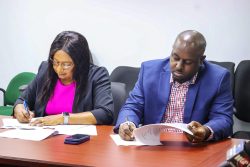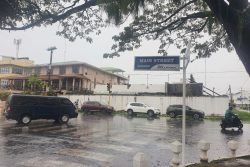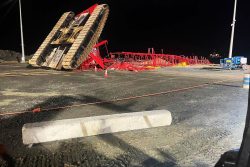As much as Guyana needs investment to transform its economy so that it doesn’t fall victim to the worst attributes of the oil wealth-driven Dutch Disease, Georgetown still has to show deftness and tact in dealing with state-led delegations prospecting for opportunities here.
Saturday saw frenetic activity at the Arthur Chung Conference Centre involving a large delegation from Saudi Arabia which had just participated in a major investment conference in the Dominican Republic and then had visited Jamaica.
Riyadh’s delegation here is headed by Badr AlBadr, the Deputy Minister for Investors Out-reach. In his address to the bevy of government ministers, officials and others, Mr AlBadr was not shy in advancing the strength of the delegation he headed and its ability to invest.
“I am especially pleased to be leading this large delegation and it’s a historical moment. The large delegation of 65 includes heads of leading Saudi companies and investment institutions [along with] representatives from different Saudi ministries and agencies as well. We feel this visit is the start of a historical moment between Saudi Arabia and Guyana and this delegation is an excellent opportunity for you to see firsthand what we have to offer you and your companies.
“We believe in the opportunities and we very much want to develop the investments dialogue which we have recently begun with you. After all, one of the engines of growth for any economy is in investments. Investments lead to asset creation, which leads to enhanced production, employment and overall economic progress. And investments link the present with the future [and] investments now in productive assets will build the future and at the same time, stimulate current demand and supply,” he said.
Perhaps inspired by President Ali being ill-advisedly garbed in style similar to his – thawb, ghutrah and iqal, Mr AlBadr then issued a démarche.
“We are coming with a club of business and large leading Saudi companies for the first time…what I’m asking is that we should really be getting special incentives, a special desk under your presidency or even in one of the ministries that handles Saudi investments and look after Saudi investors. Plus, we should be looking for also some type of terms and conditions that are tailor-made also for the Saudi companies,” he said.
Breathtaking to say the least. Unfortunately, when he spoke after Mr AlBadr, President Ali, seemingly wanting to please the Saudi delegation, injudiciously assented to some of what had been asked for.
“…not only a special desk we want to create, but we also want to create a special presence with the establishment of your embassy. But in the meantime, consider it done. As of today, there will be a Saudi Arabia Desk in the Ministry of Finance. You can hire two to three Guyanese to be part of that [desk and] we’ll put counterpart officials…,” the President said.
He added “…terms and conditions for investment from Saudi Arabia, do not worry about this. I assure you that you will never be treated less than any other investor. You can be assured of that. You will not be looked at in a lesser manner or treated in a lesser manner. We want to partner with the world but you must understand that we also want to move quickly. We have an obligation to the people of this country to deliver to them as fast as we can.”
Country desks are usually established at foreign ministries for the purpose of deeper study of relations with particular countries. What Mr AlBadr suggested – and of all places, at the Ministry of Finance or even worse, the President’s office – would seem to turn this tradition on its head. Any locating of a desk at the Ministry of Finance for Saudi Arabia is wholly unacceptable and must not be permitted. Riyadh would undoubtedly be aware of how the interests of its investors can be managed here by the establishment of a consulate or embassy or through a third country.
In acceding to the impolitic request, it appears that President Ali has eliminated G-Invest from the calculus of his thinking. For decades, investment agencies here have been ridden roughshod over by governments. The concept of a one-stop agency for investors – important as it is – has been honoured in the breach. Discretion at various levels of the government in investment transactions has opened the door to corruption and triggered scandals like those enveloping Su Zhirong. This is why a one-stop agency presiding over a standard regime for all investors has been the hallmark aspired for. It is yet to be delivered.
While President Ali properly stated that the Saudis would “never be treated less than any other investor”, what he needed to make clear was that all investor arrangements would be handled by G-Invest based on its governing act and the incentive regime at its disposal depending on the sector under consideration. What should be immediately ruled out was Mr AlBadr’s appeal for “special incentives” and “some type of terms and conditions that are tailor-made also for the Saudi companies”.
It is unclear whether preliminary discussions had been held between Georgetown and Riyadh prior to the arrival of the delegation on Saturday but there needed to have been some preparation to avoid the undiplomatic gestures in evidence. What role if any did the Ministry of Foreign Affairs play in receiving this visit? Guyana is also now in an increasingly stronger position to declare the type of investment that it is interested in – investment that will transform the base of the economy away from primary products and reliance on oil revenues.
Marvellous investment promises have often been made from the Middle East without the hint of fructification. For all the visits by senior United Arab Emirates (UAE) officials over two years and corresponding travels from Georgetown including to the Dubai Expo, Guyana is yet to see a single investment of value. To the contrary, during a visit here, a dubious UAE middleman was able to milk the Guyana Government via the sale of Russian Sputnik vaccines. A little more caution and discretion should be exercised by the government here.
Some restraint also has to be shown by George-town in advancing relations with Riyadh as difficult subjects such as the still unexplained role of the state in the killing of journalist Jamal Khashoggi in the Saudi consulate in Istanbul would have to be discussed along with the major differences that impact on the whole range of human rights, Saudi Arabia being a theocracy versus this country’s secularism etc. Guyana undoubtedly welcomes investment but it has to be on terms set by this country and without the contravening of diplomatic norms.





